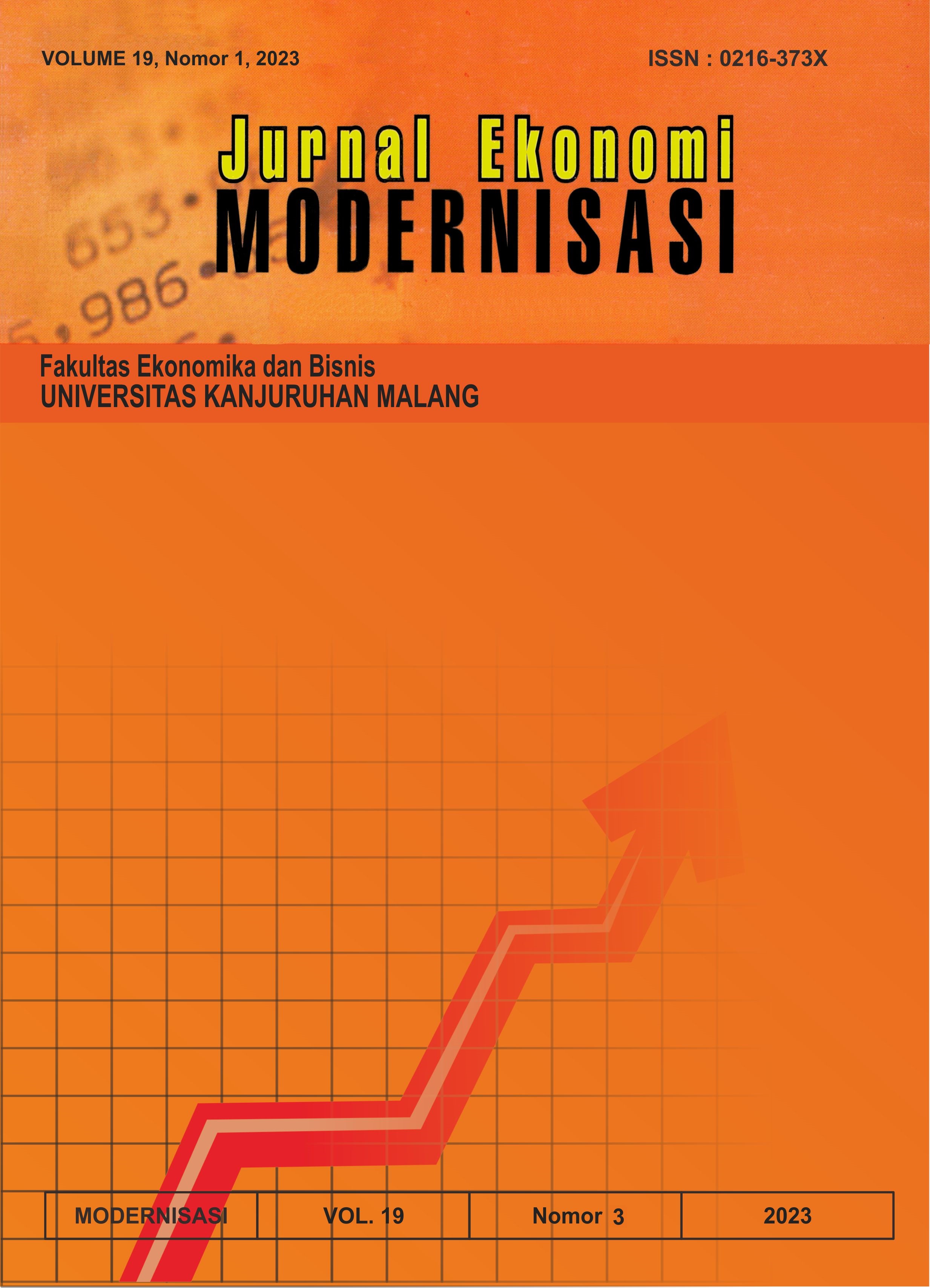Determinan wakaf tunai di kalangan milenial
Main Article Content
Abstract
The purpose of this study was to examine the effects of critical factors that influence cash waqf. This study is quantitative. The population is 2021 alumni of the Faculty of Economics and Business who are Muslim. The sampling technique was based on the criteria totaling 227 alumni. The data analysis technique used smart-PLS. The results showed that knowledge, belief, and religiosity had a positive effect on attitudes. Attitudes and subjective norms did not affect cash waqf. Behavior, intention, and awareness affected cash waqf. The implication of this study is the need for socialization of waqf among the general public. Encouragement from the family of ulama and the workplace are needed to carry out cash waqf.
Downloads
Article Details

This work is licensed under a Creative Commons Attribution-ShareAlike 4.0 International License.
Authors who submit a manuscript understand that if the manuscript is accepted for publication, the copyright of the article shall be assigned to Jurnal Ekonomi Modernisasi (JEM).
References
Ajzen. (1991). The Theory of Planned Behavior: Organizational Behavior and Human Decisoin Processes. 50(2), 179–211.
Alifiandy, M. M., & Sukmana, R. (2020). The Influence of Planned Behaviour Theory and Knowledge Towards the Waqif Intention in Contributing Waqf. JEBIS: Jurnal Ekonomi Dan Bisnis Islam, 6(2), 260–272. https://doi.org/10.20473/jebis.v6i2.22624
Amin, H., & Chong, R. (2011). Determinants of Ar-Rahnu Usage Intention: An Empirical Investigation. Africal Journal Business and Management, 5(20), 8181–8191. https://doi.org/10.5897/AJBM11.423
Atabik, A. (2016). Strategi Pendayagunaan Dan Pengelolaan Wakaf Tunai Di Indonesia. ZISWAF: Jurnal Zakat Dan Wakaf, 1(1), 1–26.
Attoillah, H. M. (2014). Hukum Wakaf. Yrama Widya.
Busry, L. H. (2020). Factors influencing the intention to contribute to cash waqf among KUIPSAS Students. Jurnal Al-Sirat, 19(1), 20–33.
Ferrinadewi. (2010). Merek & Psikologi Konsumen: Implikasi pada Strategi Pemasaran. Yogyakarta: Graha Ilmu.
Ghozali, I. (2016). Aplikasi Analisis Multivariate dengan Program IBM SPSS 23 (Edisi 8). Badan Penerbit Universitas Diponegoro.
Haidlir, B. M., Laksmono, B. S., Kasri, R. A., & Hartono., A. D. (2021). Public Behaviour on Cash Waqf: Evidence from Indonesia. Jurnal Jejak, 14(2), 316–332. https://doi.org/10.15294/jejak.v14i2.32032
Ilman, M. Z. (2019). Pengaruh Tingkat Pendidikan, Religiusitas, Akses Media Informasi, dan Pengetahuan Wakaf Uang Terhadap Persepsi Masyarakat Tentang Wakaf Uang (Studi Pada Jamaah Masjid Ramadan Griya Shanta Kota Malang). Jurnal Ilmiah Mahasiswa FEB, 8(1).
Imana, N., Santoso, A., & Kurniawan, E. (2021). Wakif’s Behavior in Money Waqf: an Approach to Theory of Planned Behavior. Ekuilibrium: Jurnal Ilmiah Bidang Ilmu Ekonomi, 16(1), 12–23.
Kasri, R. A., & Chaerunnisa, S. R. (2021). The Role of Knowledge, Trust, and Religiosty in Explaining The Online Cash Waqf Amongst Muslim Millenials. Journal Of Islamic Marketing, 13(6), 1334–1350. https://doi.org/10.1108/JIMA-04-2020-0101
Koehn, D. (2000). Landasan Etika Profesi. Kanisius.
Marzuki, A. A. A. I. A., Amin, S. A. M., Mohideen, N. A. H. R. S., & Ilyas, I. Y. (2021). The Awareness towards the Importance of Health Waqf in Malaysia. E-Journal of Media & Society, 4(2), 75–86.
Maulana, A., & Darmastuti, D. (2020). Awareness, perception, and willingness to contribute to micro waqf banks among Muslims in Indonesia. EL DINAR: Jurnal Keuangan Dan Perbankan Syariah, 8(2), 100–114.
Mayurida, Anwar, & Hasbi, M. (2021). The Urgency of Education and Literacy of Waqf in Musthafawiyah Islamic Boarding Schools. Proceeding International Seminar on Islamic Studies, 297–306.
Notoatmodjo. (2012). Metode Penelitian Kesehatan. Rineka Cipta.
Nour Aldeen, K., Ratih, I. S., & Sari Pertiwi, R. (2022). Cash waqf from the millennials’ perspective: a case of Indonesia. ISRA International Journal of Islamic Finance, 14(1), 20–37. https://doi.org/10.1108/IJIF-10-2020-0223
Osman, A. F., Mohammed, M. O., & Fadzil., A. (2016). Factor Influencing Cash Waqf Giving Behavior: A Revised Theory Of Planned Behavior. Journal of Global Business and Social Entrepreneurship (GBSE), 1(2), 12–25.
Osman, A. F., & Muhammed, M. O. (2017). Measuring A Cash Waqf Giving Behavior Among Muslim Donor In Malaysia: A Theory of Planned Behavior Approach Using Structural Equation Modelling. Journal of Muamalat and Islamic Finance Research (JMIFR), 14(2), 1–25.
Prasetijo, R., & Ihalauw, J. (2011). Perilaku Konsumen. Andi.
Rahayu, R. N. I., & Pramuka, B. A. (2022). The Influence of Information Media, Knowledge, and Subjective Norms on Interest in Performing Cash Waqf. Proceeding of International Conference Sustainable Competitive Advantage, 638–646.
Ratnasari, R. T., & Arifin, M. H. (2017). Theory of planned behavior in intention to pay cash waqf. 1st International Conference on Islamic Economics, Business, and Philanthropy (ICIEBP).
Razak, D. A., Amin, H., & Zuhaimi, A. Z. (2021). Factors influencing intentions on use of cash waqf as an aid in time of Covid-19 in Malaysia. Journal of Contemporary Business, Economics and Law, 24(3), 1–8.
Shatar, W. N. A., Hanaysha, J. R., & Tahir, P. R. (2021). Determinants of cash waqf fund collection in Malaysian Islamic banking institutions: empirical insights from employees’ perspectives. ISRA International Journal of Islamic Finance, 13(2), 177–193. https://doi.org/10.1108/IJIF-06-2020-0126
Shukor, S. A., Anwar, I. F., Aziz, S. A., & Sabri, H. (2017). Muslim attitude towards participation in cash WAQF: Antecedents and consequences. International Journal of Business and Society, 18(S1), 193–204.
Slameto. (2015). Belajar dan Faktor-Faktor yang Mempengaruhinya. Rineka Cipta.
Syarifudin, A. (1995). Sikap Manusia Teori dan Pengukurannya. Pustaka Belajar Offset.
Thaker, M. A. M. T., Thaker, H. M. T., & Pitchay, A. A. (2018). Modelling Crowdfunders Behavioral Intention to Addopt The Crowdfunding Waqf Model (CWM) in Malaysia: The Theory of The Technology Acceptance Model. International Journal of Islamic and Middle Eastern Finance and Management, 11(2), 231–249. https://doi.org/10.1108/IMEFM-06-2017-0157
Wawan, A., & Dewi. (2010). Teori dan Pengukuran Pengetahuan, Sikap dan Perilaku Manusia. Nuha Medika.
